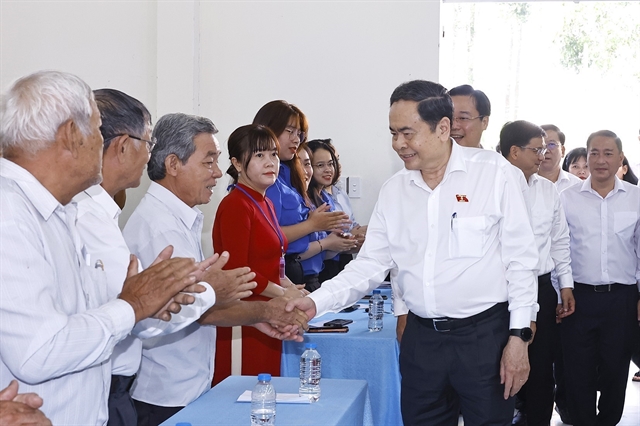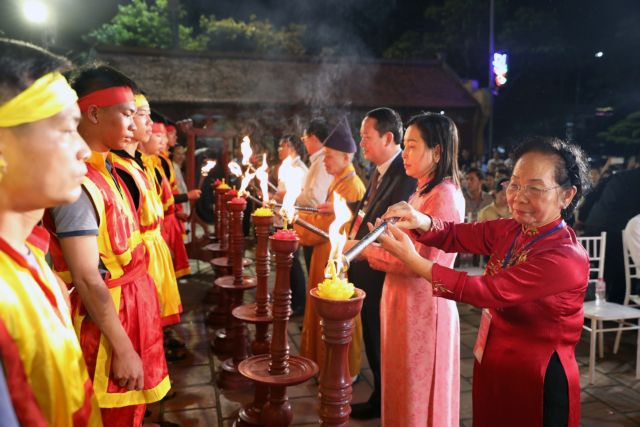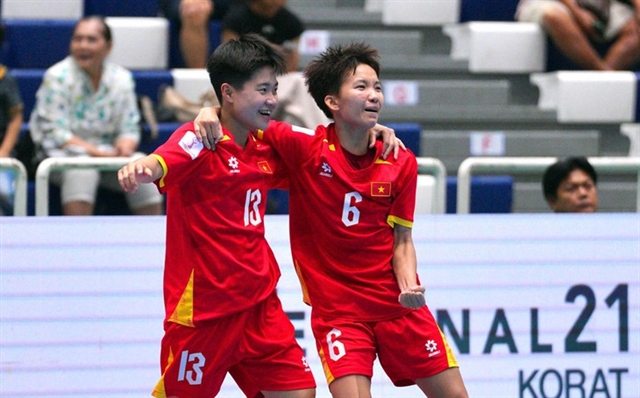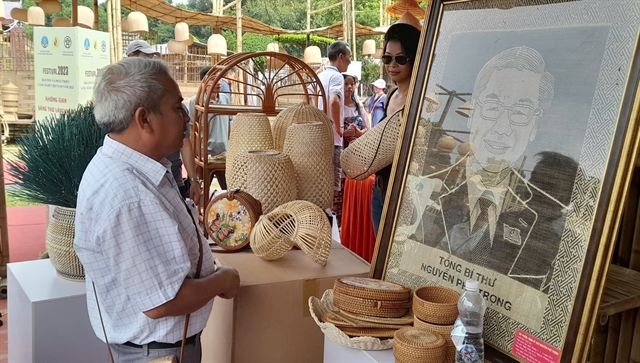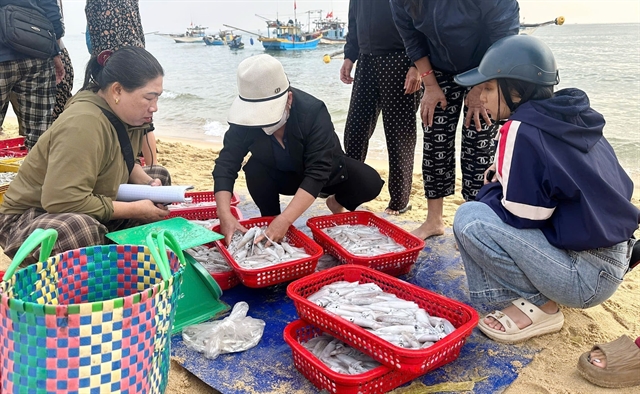 Society
Society

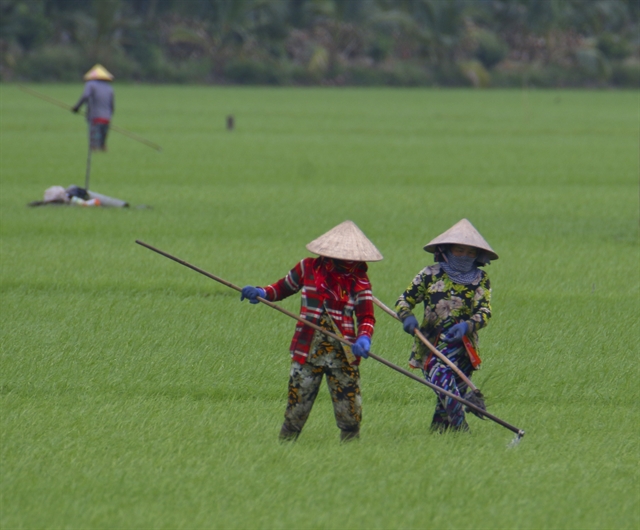
|
| Farmers take care of rice in Châu Thành A District, Hậu Giang southern province. — VNA/VNS Photo Duy Khương |
KIÊN GIANG — Deputy Prime Minister Trần Lưu Quang called for cooperation of the Government, localities and enterprises in implementing a project to sustainably develop one million hectares of high-quality rice associated with green growth in the Mekong Delta until 2030.
Chairing a conference drawing up plans for the project, which was held on Monday by the Ministry of Agriculture and Rural Development ((MARD) in Kiên Giang southern province, the Deputy PM said that the project could be considered a big challenge, because it faced four difficulties.
It would be difficult because for the first time it sets the target of one million hectares of high-quality rice while reducing emissions; because of the need to change farmers’ habits; because of the instant effect of rice price fluctuations on the market; and because of difficulty in reaching agreement related to the interests of organisations and individuals.
To help the project achieve its goals, Deputy PM Quang emphasised the principles of wholeheartedness, compliance, flexibility, cooperation and control.
Experience shows that no matter what the difficulty, if the people have the right approach, method and determination, they can do it. For example, in the fight against the COVID-19 pandemic, Việt Nam ranked ninth in the world in prevention results.
The Deputy PM confirmed that if people do not comply with plans, principles and standards, they would fail, but they must also be flexible and creative in making the work suitable for each region and location.
Especially, the work must adapt to the increasingly serious and unpredictable impacts of climate change.
He said that there must be good cooperation, first of all in negotiating loans, and coordinating between central agencies and localities, and between businesses.
He emphasised, "We will fail if each business participates in this project in its own, unique way, without strong compliance and coordination."
Besides, programmes must be well integrated to create synergy to win together.
The Deputy PM mentioned the need for good control and prompt adjustment to suit the actual situation on the basis of regular reviews, especially spreading good models and methods.
Affirming that the Government will accompany the project, he assigned the MARD to soon submit the project’s plans and policies to the Government.
He assigned the Ministry of Finance to set up a scheme to call for capital for the project.
Regarding official development assistance (ODA) capital, the Deputy PM noted that it was necessary to pay close attention to the negotiation to harmonise procedures between Việt Nam and donors, facilitating disbursement after receiving the loans.
Speaking at the conference, Deputy Minister of Agriculture and Rural Development Trần Thanh Nam emphasised that the Mekong Delta was the main rice production region of Việt Nam.
Project
Rice output in the region has recently been stable at 24-25 million tonnes per year, accounting for over 55 per cent of the country’s total amount and 90 per cent of the country's rice exports.
The yield contributes to creating jobs and stable income for millions of households in the region.
Many advanced and environmentally friendly rice production models, programmes and projects have been implemented promoting solid rice production, increasing income for farmers, reducing greenhouse gas emissions and increasing the competitiveness of Vietnamese rice.
A typical example is the Việt Nam Sustainable Agriculture Transformation Project (VnSAT) implemented in 2015-22, funded by the World Bank.
Under the project, sustainable farming techniques were applied on about 180,000ha of rice.
Farmers participating in about 400 cooperatives implemented firm farming processes.
They increased profits by 30 per cent, reduced production costs by 30-40 per cent and reduced carbon emissions by about 1.5 million tonnes per year.
However, according to Nam, the Mekong Delta rice industry still has limitations.
The region does not have many concentrated, large-scale rice areas with linkages between rice growers and cooperatives or businesses.
Rice cultivation is not sustainable because farmers still use a lot of chemical fertilisers and pesticides, which affect the environment and increase greenhouse gas emissions.
Minister of Agriculture and Rural Development Lê Minh Hoan confirmed that the project was particularly significant in transforming rice farming methods in the Mekong Delta.
It would form and develop large-scale, long-term stable concentrated raw material areas, ensuring quality and efficient crops.
Promoting effectiveness
The project will be deployed in 12 provinces and cities in the Mekong Delta, including An Giang, Kiên Giang, Đồng Tháp, Long An, Sóc Trăng, Cần Thơ, Bạc Liêu, Trà Vinh, Hậu Giang, Cà Mau, Tiền Giang and Vĩnh Long.
The project covers an area of one million hectares.
It is expected to reorganise the production system, apply sustainable farming processes to increase value, sustainably enhancing the rice industry, and improving the production efficiency and income of rice growers.
It will protect the environment, adapt to climate change and reduce greenhouse gas emissions, contributing to implementing Việt Nam's national commitments.
The goal is that by 2030, the high-quality rice areas will reach one million hectares.
Chemical fertilisers and pesticides of chemical origin will be reduced by 30 per cent.
Irrigation water will be down by 20 per cent compared to traditional farming.
Sustainable rice production standards will be certified.
All of the high-quality area has links between businesses and cooperatives or farmer organisations in production and consumption.
The synchronous mechanisation will reach over 70 per cent of the area.
Over 1,000,000 households will apply durable farming processes.
All straw will be collected and processed for reuse.
Greenhouse gas emissions will down by over 10 per cent compared to traditional rice farming.
The amount of high-quality rice exported will account for over 20 per cent of the total rice export volume of the region. — VNS

